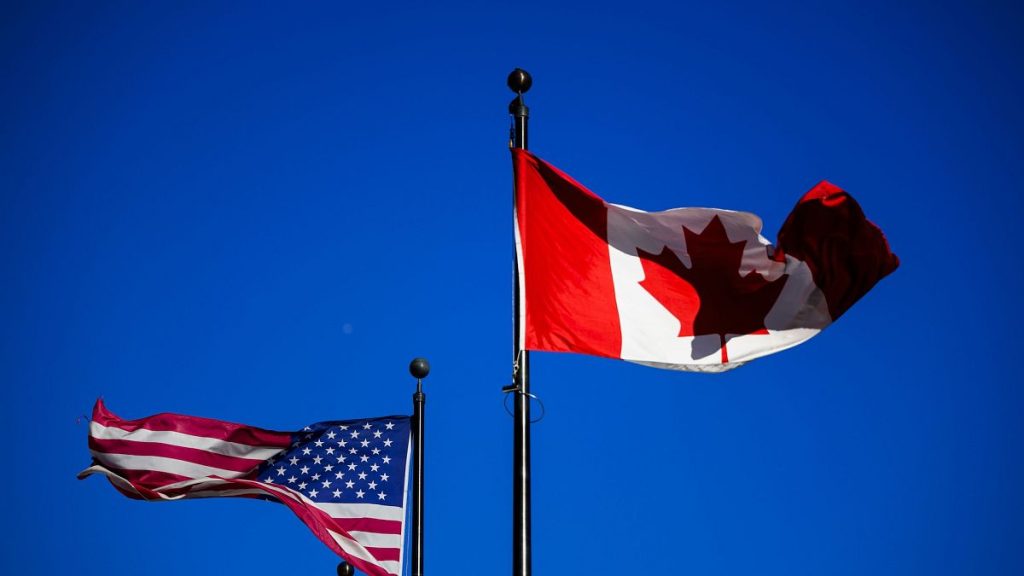The global financial landscape has been thrown into disarray by US President Donald Trump’s decision to impose sweeping tariffs on Canada, Mexico, and China, igniting fears of a full-blown international trade war. This move, announced via executive order, has sent shockwaves through global markets, prompting immediate retaliatory warnings from all three targeted nations. The tariffs, set to take effect, include a 25% levy on goods from Canada and Mexico, and a 10% tariff on Chinese imports. While Canadian energy imports will face a reduced 10% tariff to mitigate potential disruption to US fuel prices, President Trump has indicated that retaliatory actions could lead to further increases or expansions of these tariffs.
The immediate market reaction has been one of widespread volatility. The US dollar surged, while currencies of nations exposed to the tariffs plummeted. The Canadian dollar hit a two-decade low against the US dollar, and the Mexican peso slumped to a four-year low. The euro also experienced a significant drop against the dollar, reaching a two-year low. Commodity currencies like the Australian and New Zealand dollars suffered similar fates, reflecting the global risk-off sentiment. While crude oil prices initially spiked before retreating due to the lower tariff on Canadian energy, metals like gold, silver, and copper declined amidst the strong dollar. Cryptocurrencies also felt the pressure, with Bitcoin experiencing a significant drop.
Equity markets across Asia declined, echoing anxieties over the escalating trade tensions. US and European stock futures also indicated a sharp downturn. Sectors vulnerable to the tariffs, particularly the automobile industry, are expected to bear the brunt of the impact. European car manufacturers, especially those with production facilities in Mexico, face significant uncertainty. Market analysts predict a sustained risk-off approach among investors, fueled by President Trump’s apparent indifference to the market’s negative reaction. Government bond yields, reflecting borrowing costs, are also expected to come under pressure in both the US and EU. While long-term government bonds are traditionally seen as safe havens, the potential for the tariffs to exacerbate global inflation could disrupt central banks’ easing policies.
The targeted nations have wasted no time in announcing countermeasures. Canada plans to impose retaliatory tariffs of 25% on C$155 billion worth of US goods, encompassing a wide range of products from alcohol and agricultural products to consumer goods and materials. Some of these duties will take effect immediately. Economists warn that these reciprocal measures, coupled with the US tariffs, could push Canada into a recession, marking its first economic contraction since the pandemic. President Trump has justified the tariffs as a measure to curb illegal immigration and the flow of illicit drugs, particularly fentanyl, implicating both Mexico and China in these issues.
Mexico, while not immediately announcing specific counter-tariffs, has indicated its intention to retaliate. President Claudia Sheinbaum revealed that Mexico is developing a “Plan B” encompassing both tariff and non-tariff measures to protect its interests. Details of this plan are expected to be unveiled soon, with an emphasis on a collaborative approach and shared responsibility. China, too, has expressed strong opposition to the US tariffs, deeming them a violation of World Trade Organization (WTO) rules. China intends to file a lawsuit with the WTO while remaining open to negotiations. They have urged the US to reconsider its actions and work towards a resolution.
This escalation of trade tensions presents a significant threat to the global economy. The interconnected nature of international trade means that the impact of these tariffs will likely ripple across borders, affecting businesses, consumers, and financial markets worldwide. The uncertainty surrounding the future trajectory of these trade disputes adds another layer of complexity, making it difficult for businesses to plan and invest. The possibility of further retaliatory measures and the potential for a full-blown trade war creates a volatile and unpredictable environment, leaving global markets bracing for the potential fallout. The hope remains that dialogue and negotiation will prevail, leading to a de-escalation of tensions and a return to more stable trading relationships.
The longer-term implications of this trade dispute remain unclear, but the immediate impact has been undeniably disruptive. The potential for a global trade war poses a significant risk to economic growth and stability, highlighting the importance of international cooperation and adherence to established trade rules. The interconnectedness of the global economy makes it crucial for nations to find common ground and work towards resolving these disputes through dialogue and negotiation, rather than resorting to protectionist measures that could ultimately harm all parties involved.














